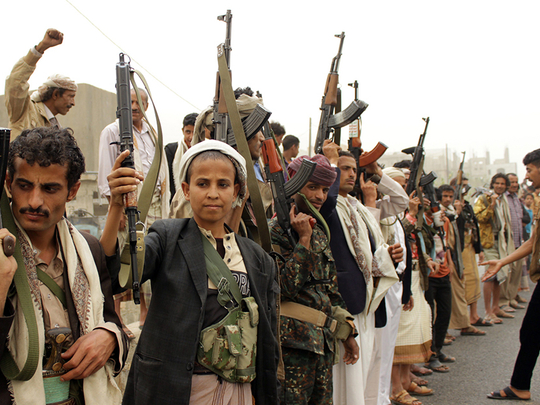
Yemen has missed out on two good opportunities in its recent past; the first was in the 80s when the Gulf Cooperation Council (GCC) stressed the importance of Yemen’s economic structure and development of its natural resources. The GCC also called for improving the vocational and technical skills of Yemen’s national cadres to pave the way for Yemen to join the GCC as an active member that would offer a qualitative addition through its human resources and economy. The opportunity was based on the logic that if your neighbour is ill, quickly treat him so that you may not fall sick as well.
The second opportunity was during the sixth war in 2009-2010, when Yemen waged a military campaign on the strongholds of Al Houthi rebels in Saada and Maran mountains prior to the resignation of now former Yemeni president Ali Abdullah Saleh. The Yemeni army was victorious in that war. It was a conflict between a recognised legitimacy and rebels who wanted to take over the country. However, those opportunities are now gone, benefiting neither Yemen nor its people.
The first opportunity was wasted when Yemen, represented by the government, was unable to improve the economy, develop human resources or crack down on corruption and money wasting in the country’s institutions. Some GCC countries were also hesitant on taking such a vital and strategic step.
The second opportunity was missed due to a lack of clarity in the Yemeni leadership’s vision, and lack of true desire to put a stop to the rebellion of Al Houthis and others who might rebel in the future. The war was stopped prior to the legitimacy reaping the benefits of the battle. Furthermore, neighbouring GCC nations refrained from deciding the battle for the good of Yemen; on the basis of ‘if the Yemeni president does not want to decide the battle for the good of his nation, then is it the right of Yemen’s Gulf neighbours to do so’?
Prior to the silence that lasted longer than necessary a statement was issued by the GCC. Bahrain’s Foreign Minister Khalid Bin Ahmad Al Khalifa said the GCC will not hand Yemen over to Iran, and that statement was not believed by Arab analysts and some foreign analysts as well. “We will not allow the presence of terrorist organisations in Yemen,” said a statement issued by GCC Secretary-General Abdul Latif Bin Rashid.
Two days prior to operation Decisive Storm, Iranian newspaper Jahan, which is closely affiliated with Iranian decision makers, said even though GCC and Arab countries may possess advanced technologies and arsenals, they do not dare to make any decisions such as waging a war or thwarting any attack committed on them because they are stripped of any political will and their decisions are dependent on foreign countries. The rest of the article continues in the same aggressive and mocking manner.
Observers said Al Houthis will move faster than any of the leaders expect. Some have even pointed out to the fact that Al Houthis were able to take over and rule Yemen in 2014, right before the eyes of the international community.
Historically speaking, Iranians are masters of chess. In statements issued days prior to Operation Decisive Storm, they said that they will soon be the dominant force in the region. Iran and its admirers from various parts of the Arab and Islamic world who follow up on its ‘achievements’, clearly believed that they can fulfil this goal. Iranians are very well aware of what they want, particularly when it comes to matters that lie outside their country, such as their desire to play a key role in the region.
A number of Iranian political and religious officials issued statements brimming with confidence, saying that Iran now practically controls four Arab capitals: Beirut, Damascus, Baghdad and Sana’a. This achievement was almost realised until the unexpected Operation Decisive Storm began on Thursday morning.
So what does the operation mean to countries in the region and their peoples? What does it mean for the people of Yemen, who are shot with live ammunition during protests? What is the operation expected to achieve on the medium term? Another question is if the operation will lead to a division between the North and South of Yemen, just like the times prior to the country’s unification.
Who will rule Yemen following the operation, and what kind of state will Al Houthis be in once the GCC storm has calmed?
Observers note that Operation Decisive Storm has restored the faith of the GCC and Yemeni people in the success of joint work. One of the goals that will be achieved by the operation, which looks set to continue for the coming weeks, is the formation of a nucleus for an Arab force. This force can be built upon, strengthened and supplied with everything necessary to ensure that it is capable of intervening when necessary in the Arab or nearby region. Sooner or later, this topic will be an important item on the agenda of Arab officials. It is perhaps the first time that the GCC, particularly Saudi Arabia, has made such an important and crucial decision for the interests of Yemen and its people.
The operation also serves to confirm that political will can be built through wisdom and diplomacy, especially when countries enjoy good relations that are based on mutual interests spearheaded by strong economic ties. However, it is also important to consider what’s to come following Operation Decisive Storm, therein begins the process of picking up the pieces and reconstruction that will cost large sums of money.
The most important question, however, is what kind of repercussions will the operation have on the medium term on neighbouring Iran? Only time will tell.
— Mohammad Hassan Al Harbi is a writer and journalist.










